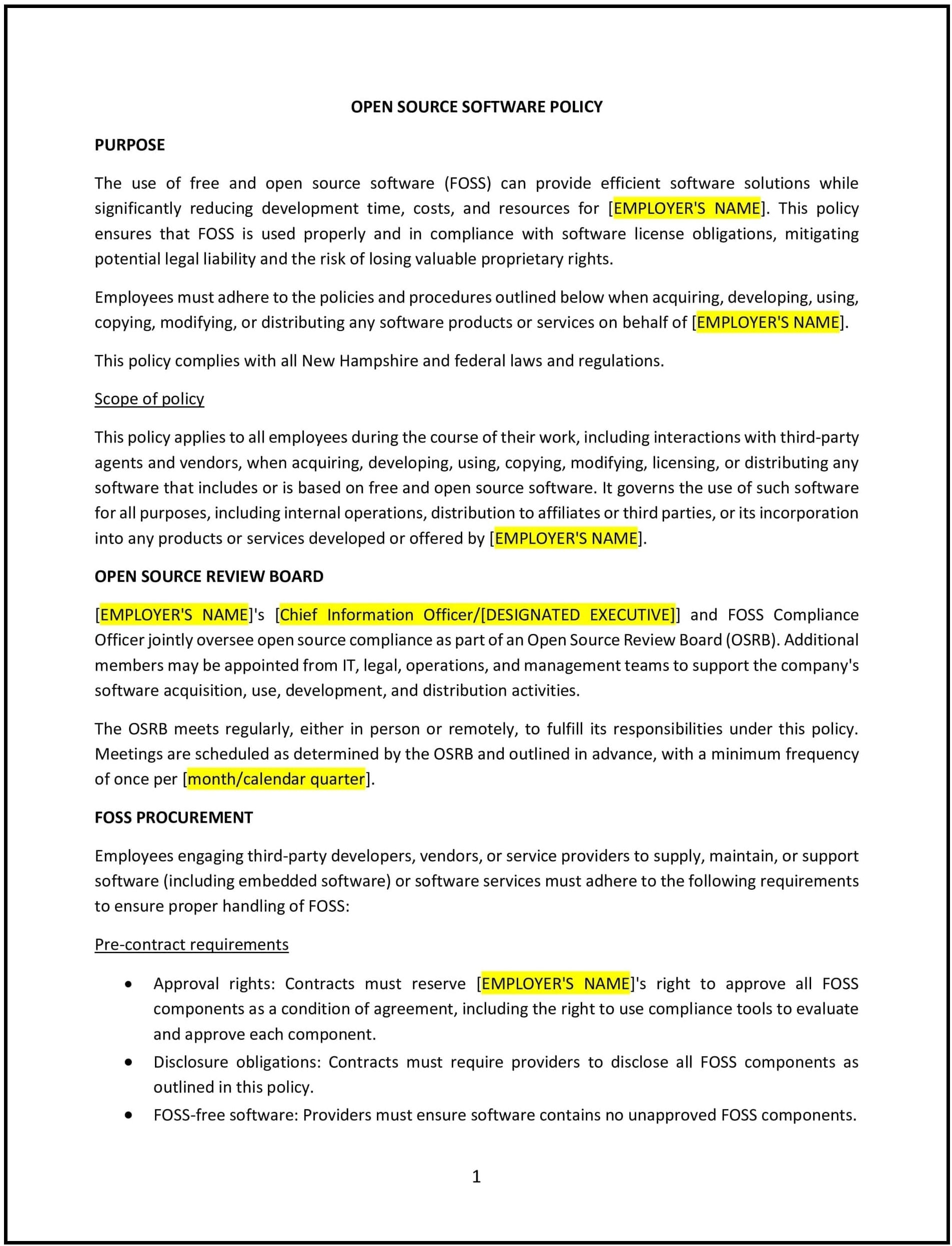Open source software policy (New Hampshire): Free template
Got contracts to review? While you're here for policies, let Cobrief make contract review effortless—start your free review now.

Customize this template for free
Open source software policy (New Hampshire)
An open source software policy helps New Hampshire businesses manage the use of open source software (OSS) in their operations. This policy outlines the guidelines for evaluating, acquiring, and using open source software, while ensuring that employees understand the potential legal and security risks associated with OSS.
By adopting this policy, businesses can take full advantage of open source software while mitigating any legal or compliance issues, and ensuring secure usage within the company’s IT infrastructure.
How to use this open source software policy (New Hampshire)
- Define open source software: Clearly explain what constitutes open source software and the benefits of using OSS, such as cost savings, flexibility, and access to community-driven development.
- Set evaluation criteria: Outline the criteria for evaluating OSS, including assessing the software’s security, compatibility with existing systems, licensing terms, and potential support from the community.
- Address licensing compliance: Specify the importance of complying with open source licenses, and explain how employees should ensure that software usage aligns with the terms of the applicable licenses (e.g., GPL, MIT, Apache).
- Require documentation and tracking: Establish procedures for documenting and tracking all OSS used by the company, including where the software was sourced, its version, and the license under which it is used.
- Control distribution and modification: Define the company's approach to distributing or modifying open source software, ensuring that any modifications are compliant with the original license and do not violate the terms of use.
- Set security guidelines: Implement security guidelines for the use of OSS, including regularly updating software, patching vulnerabilities, and ensuring that the software does not expose the company to cyber threats or data breaches.
- Require approval for new software: Ensure that any new open source software introduced into the company’s IT environment is reviewed and approved by the appropriate IT or legal team to ensure it complies with company policies.
- Review and update: Regularly review and update the policy to reflect changes in the legal landscape, technological developments, or new risks associated with open source software.
Benefits of using this open source software policy (New Hampshire)
This policy provides several benefits for New Hampshire businesses:
- Protects company legal interests: By setting clear guidelines for licensing and compliance, the policy helps avoid legal risks and penalties associated with unauthorized use or distribution of OSS.
- Enhances security: The policy ensures that all open source software used by the business is regularly updated, securely configured, and properly vetted, reducing the risk of security vulnerabilities.
- Improves software management: By creating a centralized process for tracking and approving OSS, businesses can streamline the management of software assets, avoid redundancy, and ensure efficient usage of resources.
- Supports innovation: Encouraging the use of open source software can foster innovation, as employees can leverage community-driven software that enhances business processes without the high cost of proprietary software.
- Increases transparency: A clear policy on OSS helps ensure that all employees understand the company’s stance on open source usage, leading to better compliance, communication, and decision-making.
Tips for using this open source software policy (New Hampshire)
- Communicate the policy clearly: Make sure that all employees involved in IT, software development, or purchasing are aware of the open source software policy and understand the guidelines.
- Educate employees about licensing: Offer training to employees on the different types of open source licenses and the importance of adhering to licensing terms to prevent inadvertent violations.
- Ensure regular software reviews: Implement a system to regularly review and update OSS used by the company, ensuring that all software is up to date and that new versions are reviewed for compatibility and security.
- Encourage collaboration: Promote the use of open source software as part of the company’s strategy to collaborate with external communities, but make sure it aligns with company objectives and legal requirements.
- Involve legal and IT teams: Ensure that both the legal and IT departments are involved in reviewing and approving new open source software, ensuring all compliance and security concerns are addressed.